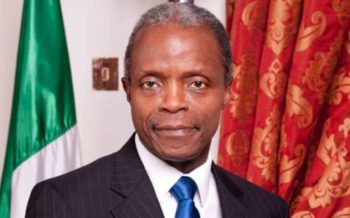
Nigeria aims to end its use of a list of 41 import items for which local firms cannot get hard currency from the Central Bank and instead focus on trade policy-driven curbs on access to hard currency, Vice President Yemi Osinbajo said on Tuesday.
The 41 items’ restriction from the official foreign exchange window by the Central Bank of Nigeria (CBN), was introduced in 2015 by the to support the naira after it was hammered by a fall in oil prices. The policy has however led to the closure of plants in various sectors, as they have been unable to import the raw materials or spare parts they need to stay in production.
The government instead plans to switch to “more trade policy-driven restrictions, taking into account those items that are required and locally unavailable raw materials,” Osinbajo said, according to a statement by the presidency. He did not elaborate.
“In stabilizing the macro-economic environment we have focused on aligning fiscal with monetary policy and nudging the CBN towards the objective of more market-determined exchange rates,” he said.
Osinbajo said there was “light at the end of the tunnel” for Nigeria, which is undergoing its first recession in a quarter of a century.
The major oil producer has suffered from dollar shortages due to a fall in oil revenues, hurting both the public finances and the country’s foreign reserves.
To avoid having to devalue its currency again, the central bank is running a system of multiple exchange rates that has confused investors.
On Tuesday a central bank spokesman said the bank has been working to make exchange rates converge on the official and black markets.
The naira was quoted weaker on Tuesday at an investor trading window, at 380.31 per dollar, data from market regulator FMDQ OTC Securities Exchange showed. The official market rate was 305.85 while on the black market a dollar fetched 390 naira.
Analysts doubt whether the central bank can sustain such sales. The convoluted exchange rate system masks pressure on the naira with the regulator trying to avoid a devaluation.
Copyright Ships & Ports Ltd. Permission to use quotations from this article is granted subject to appropriate credit given to www.shipsandports.com.ng as the source.